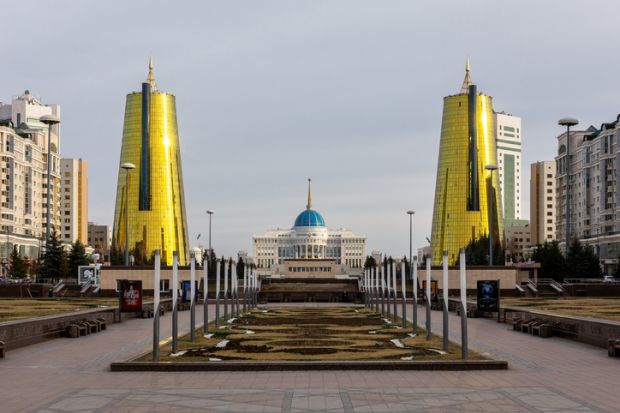Kazakhstan is angling to draw students from across Asia – and, critically, tap into the expertise of Western universities – in its bid to become a regional higher education hub.
“We have once in-a-lifetime opportunity because of the two major driving forces,” Sayasat Nurbek, the country’s higher education minister, told Times Higher Education.
Two billion people live in greater Asia and Eurasia, more than half of them under 25, with demand for study in Kazakhstan now outstripping supply. The government expects last year’s total enrolment of 623,000 to grow to more than 1 million by 2030.
Meanwhile, the war in Ukraine has displaced thousands of students – many of them from India, Pakistan and former Soviet countries – and shows no sign of ending.
Speaking during a visit to the UK aimed at encouraging British universities to open branch campuses in Kazakhstan, Mr Nurbek was reluctant to give the impression that his country was benefitting from the war, telling Times Higher Education “it’s a quite sensitive issue”. Still, he described Kazakhstan as a place with “reputable education” and a sector that stands to benefit given the fact that “a lot of students have nowhere to go”.
In an effort to entice institutions, the country is cutting red tape and sweetening the deal with financial incentives.
“We’re completely reshuffling our regulatory framework,” said Mr Nurbek, adding that several accreditation agencies had established offices in the country.
British institutions should be free to “continue business as usual” using their own regulations, he said.
International universities that set up joint campuses will benefit from financial support from Kazakhstan’s government. The country is also investing in new campuses and academic cities, with a special economic zone modelled on the United Arab Emirates’ University City.
While the signal that it is open for business is loud and clear, the country’s efforts to reorient its higher education system towards the West is not wholly new: Kazakhstan joined the Bologna process in 2010, and universities were encouraged to teach in English with concerted efforts to recruit international faculty. However, there have also been challenges in recent years, including a deadly crackdown on protests against inequality and corruption.
Regardless, Kazakhstan’s bid to attract branch campuses appears to have made a good start. Three universities – one in Russia and two from the West – opened outposts in the country between 2021 and 2022, including the UK’s De Montfort University.
This year, another six are due to open, including Heriot-Watt University; Seoul National University of Science and Technology (SeoulTech); the Kazakhstan-German University, which will focus on alternative energy; and the New Ulytay University, specialising in mining, metallurgy and engineering, formed in partnership with a consortium of Canadian institutions.
There are plans for another three branch campuses by 2029 – and that’s just the beginning of Kazakhstan’s ambition, according to Mr Nurbek.
“We can serve as a safe haven for the region. No wars, a very stable political regime…it might be a good destination to come and have a piece of that bigger education market.”
Register to continue
Why register?
- Registration is free and only takes a moment
- Once registered, you can read 3 articles a month
- Sign up for our newsletter
Subscribe
Or subscribe for unlimited access to:
- Unlimited access to news, views, insights & reviews
- Digital editions
- Digital access to THE’s university and college rankings analysis
Already registered or a current subscriber? Login








